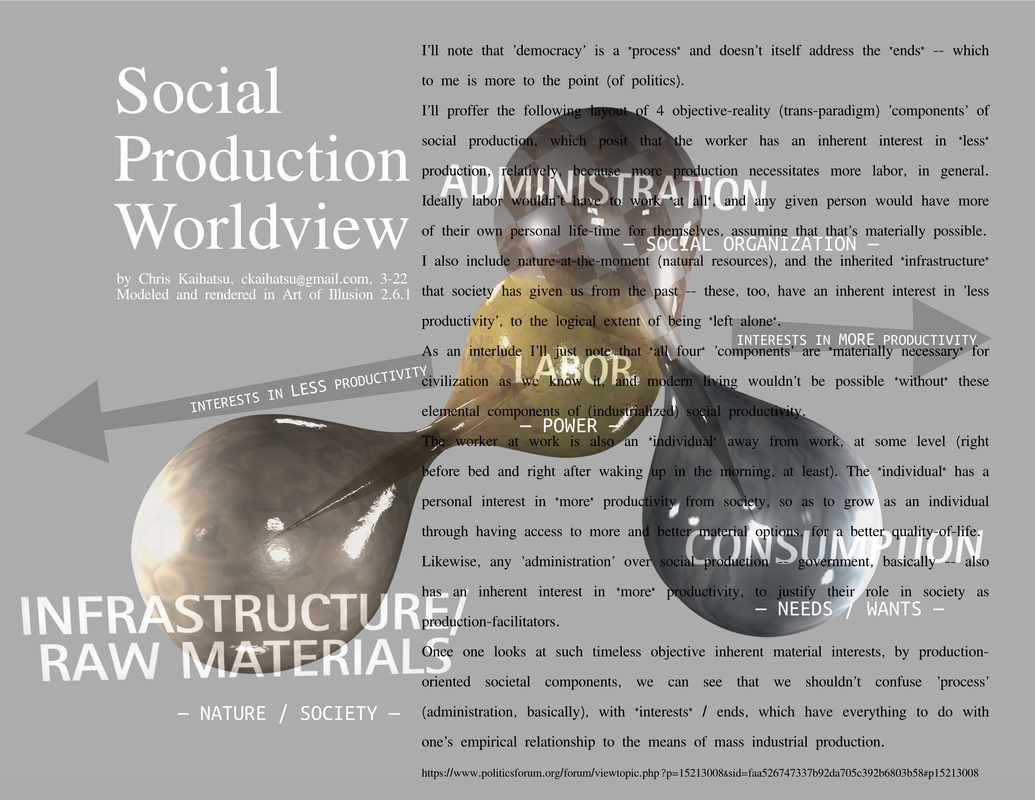ckaihatsu wrote:If genetics is so 'overriding' (or else *you* provide a qualitative description), then there *can't* be any free-will, because it's our *genes* that are doing the talking.
What are you talking about? Your genes largely determine who
you are. If
you are doing the choosing, that's free will by definition.
See? A pseudo-issue.
Obviously, from looking at various cultures and religions, anyone can see that personal beliefs are very much *socially determined*
Beliefs are not the same as personality and choices, and statistics do not describe individuals.
(the political 'superstructure', which is dialectically related to the 'base' of socio-material social production).
Nope. That's just more anti-scientific Marxist bull$#!+.
Snideness for the sake of snideness, huh -- ?
No, truth for the sake of humanity.
A *moment* ago you were treating socialism rather even-handedly, but now your handlers have yanked on the leash, and you're back to your blase casual dissing of anything non-market-values.
You were talking about anti-geoism, not socialism.
Go on. (I'm hoping to catch you in a fleeting sun-breaking-through-the-clouds moment of *critical* / enlightened political sentiment.)
Your absurd Marxist critical theory is not enlightened, it is a form of brain damage.
Aren't you supposed to have some kind of *indestructable weapon* for what you're doing -- ? (grin)
The truth is certainly indestructible. But that does not mean it is
omnipotent, because people -- like socialists and capitalists -- are free to choose lies over the truth.
Point-A-to-Point-B -- ? Anyone?
First, understand the problem. Hence my efforts here.
What *you* mean is 'Those who do the paperwork and who are at the Board of Trustees meetings' when you say 'producers'.
No I don't. I mean those who contribute to relief of scarcity.
That's quite a *stretch*, really, since the executive class
There is no "executive
class." There are just people who have been hired as managers because they have the intelligence, skills, knowledge and experience to understand, plan, coordinate, direct and control production and solve related problems.
hasn't produced a single commodity,
That is of course an outright falsehood. Relief of scarcity takes many forms in addition to "production of commodities"; and the manager's application of his skills is most definitely labor -- human effort devoted to production -- that contributes far more to production of commodities than the labor of the semi-literate machine-tenders you so absurdly claim are capable of managing a productive enterprise.
so are hardly 'producers'.
As previously noted, you have obviously never held a job in any productive capacity, so you have not the slightest idea what producers do or who they are. I have.
Set aside the comic book lingo and talk normally,
I will continue to identify the relevant facts of objective physical reality in clear, simple, grammatical English.
and there'll be some reason to reply
I don't care if you reply. You are just here as a negative example, a stalking horse, someone for me to demolish and humiliate for the benefit of readers who are open to learning something (i.e., not you).
-- many would *disagree* with your 'theory' there,
It's not a theory. It's a plain fact.
since there *is* such a thing as economic *factionalism* under capitalism.
That's just another non sequitur fallacy from you.
Should interest rates be *raised*, to tamp-down economic activity and benefit *savers* / rentier capitalists, or should interest rates be *lowered* (as has mostly been the case in recent decades) to benefit *investors* and money-capitalists -- ?
That depends on whose consumption you want to enable, and when. It's also a false dichotomy fallacy.
Here's "another" type of economic activity that's kinda *hard to bury*:
The sad thing is, you think that is relevant to something. It's actually easy to bury if you are committed to justice (hint: you aren't).
You tell me -- this was *your* metric.
No it wasn't. It was yours. I proposed market value as the metric of cost and benefit. You claimed you could do it using GDP. OK. How?
(You may want to specify a particular political-economy paradigm.)
I have: the geoist paradigm of liberty, consent, and justice.
Then how do you account for the 1,000 deaths per year in the U.S. at the hands of cops? That's the *state* in action.
No, it's a
particular state. It's also a very small number compared to how many would be killed by fellow civilians in the absence of a state, as history proves.
What metric then would determine people's *access* to the fruits of AI (by extension) if there are 'no workers', getting *no wages*.
Previous contributions to production and just compensation for the abrogation of people's rights by exclusive tenure.
That's just *naysaying*.
No, it's a plain fact, confirmed by historical experience.
No, you *haven't*
I most certainly have, and I will thank you to remember it.
-- you just *claim* so,
Any reader can confirm the truth of my statement.
and out of the *other* side of your mouth you do-acknowledge that employment is the *exploitation* of labor.
 NO!!HOW MANY TIMES DO I HAVE TO EXPLAIN IT TO YOU?FOR THE HUNDREDTH TIME: EMPLOYMENT CAN ONLY EXPLOIT WORKERS WHEN -- AS UNDER CAPITALISM -- THEIR RIGHTS HAVE BEEN FORCIBLY REMOVED WITHOUT JUST COMPENSATION, DEPRIVING THEM OF THEIR OPTIONS AND THUS THEIR BARGAINING POWER.
NO!!HOW MANY TIMES DO I HAVE TO EXPLAIN IT TO YOU?FOR THE HUNDREDTH TIME: EMPLOYMENT CAN ONLY EXPLOIT WORKERS WHEN -- AS UNDER CAPITALISM -- THEIR RIGHTS HAVE BEEN FORCIBLY REMOVED WITHOUT JUST COMPENSATION, DEPRIVING THEM OF THEIR OPTIONS AND THUS THEIR BARGAINING POWER.
THAT IS NOT THE SITUATION IN A GEOIST ECONOMY.Collectivization has to be by the workers,
If they want to die by starvation or violence.
around the sites / workplaces of *social production*.
Production is inherently private, not social.
You definitely underestimate the role of labor in society's productivity.
No, I identify its contribution accurately: the value it would produce in the absence of the producer goods the entrepreneur, investor and factory owner contribute to the production process.








 Measured how?
Measured how?
 - By Rich
- By Rich - By Fasces
- By Fasces